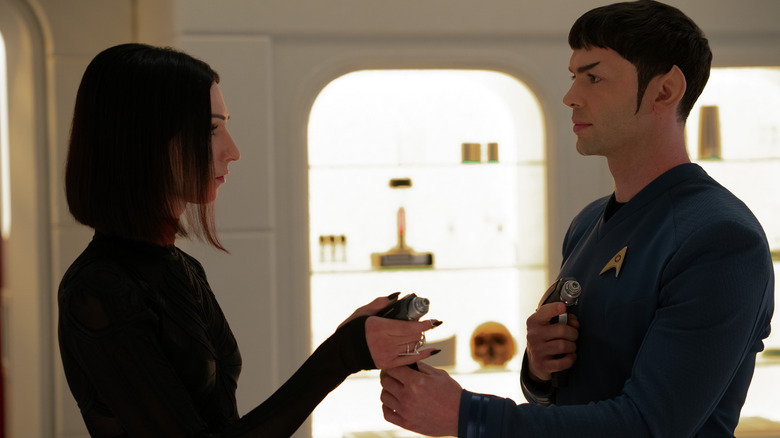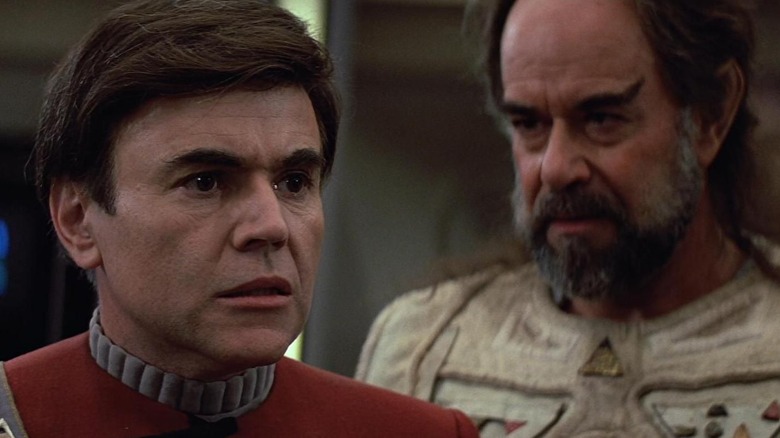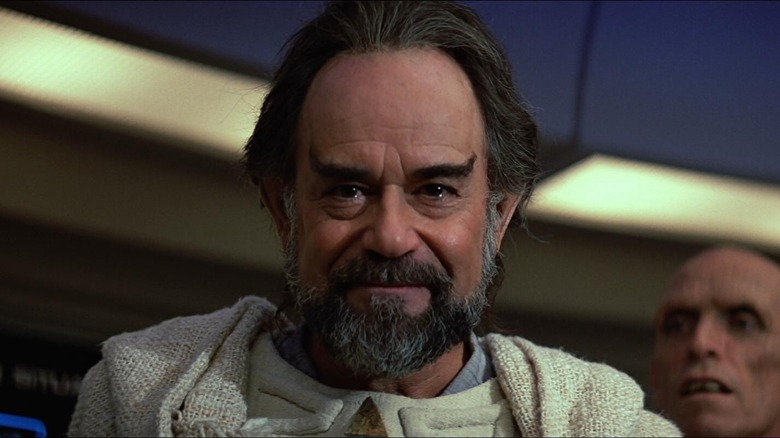That Character At The End Of Star Trek: Strange New Worlds Episode 7 Has A Wild History
This article contains spoilers for "The Serene Squall," the seventh episode of "Star Trek: Strange New Worlds."
One of the central romantic relationships in "Star Trek: Strange New Worlds" is between Spock (Ethan Peck) and his intended T'Pring (Gia Sandhu) as they struggle to remain in contact while he is off on his five-year mission. Vulcans, to remind the reader, are betrothed at childhood, and T'Pring was to be Spock's wife. She was previously played by Arlene Martel in the original series episode "Amok Time," where all these details were first revealed. On "Strange New Worlds," T'Pring is granted a larger backstory, a vocation, and interests beyond which man she wishes to marry (she'll come to prefer a character named Stonn, played by Lawrence Montaigne in 1967 and Roderick McNeil in 2022). T'Pring works at a rehabilitation facility for Vulcans — called Ankeshtan K'til — who have lost sight of their logic, given over to passions, and committed horrible crimes. Yes, even Vulcans kill. Additional reminder: Because Vulcans live by an ethos of rejecting emotion and embracing logic, outward displays of passion are considered near-criminal acts.
For the most part, "Star Trek" has seen Vulcans ably keeping their emotions under wraps (although certain Trekkies get a perverse thrill over the multiple instances when Spock "breaks" and becomes happy or angry). There has been one notable instance, however, of a passionate Vulcan appearing as a main character in a Trek story: The character of Sybok (Laurence Luckinbill) was the antagonist of William Shatner's 1989 film "Star Trek V: The Final Frontier." Sybok, we learn in that film, was Spock's long-lost, never-mentioned half brother. Sybok has a cameo at the end of "The Serence Squall" as a potentially dangerous inmate at Ankeshtan K'til.
Sybok
It's been mentioned multiple times throughout Trek that Vulcans were once — many centuries ago — passionate and violent like humans, and had pushed themselves to the brink of extinction. It was Surak, a messiah-like figure, who introduced the Vulcan ethos of logic-above-all, and their planet has been peaceful and united ever since. Vulcans may be capable of emotions, but have learned to reject, ignore, and suppress them in favor of intellect (there has been no mention of Vulcans evolving to the point of simply not having the parts of their brains that process emotions, but that's a Trek theory for another time). Occasionally, however, a Vulcan will reject their home planet's way of life, and embrace emotions with fringe, criminal groups.
Sybok was one such passionate Vulcan, and his introduction in "Star Trek V" — a nice cold open on an otherwise pretty dismal film — shows him as a mysterious man on horseback who psychically "cures" a vagrant in the desert before revealing his Vulcan ears. He then throws his head back in laughter, a shocking image for Trekkies unused to laughing Vulcans. Later, Spock will reveal that he and Sybok share a father (Sarek, played by Mark Lenard), and that he, long ago, left Vulcan society to pursue his passions out on the fringe. In so doing, Sybok developed a technique to reach into people's minds and essentially eradicate the negative emotions connected with their worst memories. In so doing, his "patients" joyously and unquestioningly begin following him as a cult leader. One of the grand ironies of "Star Trek V" is that Sybok doesn't seem to realize that he has simply found a new way to repress emotions.
V'tosh ka'tur
Sybok also, while pursuing his passions, became obsessed with the legend of Sha Ka Ree (named after Sean Connery, the actor initially approached to play Sybok), that stated that the center of the galaxy was not a supermassive black hole, but a mysterious blue planet where God physically lives. In "Star Trek V," Sybok hijacks the Enterprise, flies it to the center of the galaxy (27,000 lightyears from Earth, by the way), and meets a being that may — or may not — be God. If it is, then Spock, a creature of pure logic, kills it. Logic destroys God. There may be an unsubtle theological argument being made. Sybok ultimately dies fighting the God-thing, turning his passions into a wrath that will save others.
Passionate Vucans would play a large part in several episodes of "Star Trek: Enterprise," as well, specifically in the episode "Fusion" which aired on February 27, 2002. In that episodes, the Enterprise encountered a ship of fringe-dwelling, passionate Vulcans that their homeworld referred to as v'tosh ka'tur or, literally translated, "Vulcans without logic." The characters in "Fusion" weren't without logic, but did embrace an emotional way of life. It was implied in "Fusion" that there was a groundswell of discontentment back on Vulcan, and that some sort of emotional revolution or reckoning might be at hand.
The v'tosh ka'tur were brought back in episode five of "Strange New Worlds," and Spock, in encountering an adherent, punched him (a character named Barjan T'or) in the face. It was the logical thing to do. Although outcasts, v'tosh ka'tur are seen as people that can be aided in a mental health facility, and several of them are seen being aided by T'Pring at Ankeshtan K'til ... including Sybok.
Sybok and Angel
While "The Serene Squall" focuses on a group of freelance space pirates — their ship even has a stand-up, two-handed helm like on a three-masted sailing vessel — it also points to a deeper plot regarding their leader, the badass Angel, played by Jesse James Keitel (aka Peroxide of the drag troupe Haus of Femanon). Angel spends the bulk of the episode conversing with Spock (they are undercover as a person in need) asking about his character. By the episode's end — after their attempt to take the Enterprise has gone awry — Angel gives Spock the slip, pointing out that he doesn't have to choose between being Vulcan or Human. He can be unique unto himself. Passionate, perhaps? Angel also makes constant mention of a mysterious lover named Xavierus whom she has been trying to free from Ankeshtan K'til, getting T'Pring involved in the plot.
Xavierus was — musical sting — a mere pseudonym for Sybok, as Spock explains in the episode's epilogue. He reiterates what was stated in "Star Trek V." That Sybok is Spock's older brother, that he was born out of wedlock, and that he left the Vulcan order to follow an emotional life. Given the passions Spock displayed in "The Serene Squall" (he kisses two different people), the parallels between the two characters are more closely drawn.
Fan service
"Strange New Worlds" may move forward with the Sybok plot, giving him more backstory prior to the events of "Star Trek V," giving a known character a chance to redeem their image after decades of association with a frequently maligned feature film. Depending on how the writing shakes out, Sybok — and Angel — may be poised to be recurring antagonists. Or — less likely — the showrunners may simply leave the reference as it stands, with no further acknowledgement of Sybok beyond recognizing that he exists in this continuity, and has connections to other Trek shows and movies.
Sybok's inclusion reveals a delicate game that "Strange New Worlds" has been playing in terms of its fan service. Many of the show's main characters are returning from previous iterations, but the show is not going out of its way to include fan-recognized details or clumsy foreshadowing as a matter of course; non-Trekkies will not be lost for a second and can enjoy the show without necessarily knowing about the instance when Nurse Chapel said she was in love with Spock in 1966. Sybok's appearance, conversely, leans more in the fan-service direction, as he will likely only be recognized by Trekkies, or people who still recall details of "Star Trek V" — often called "the bad one" — with clarity. Let's hope the show, should it move forward with Sybok, is tactful.




